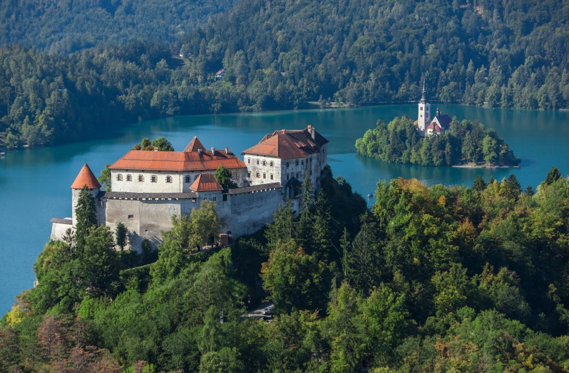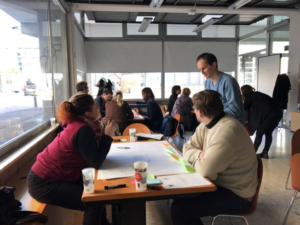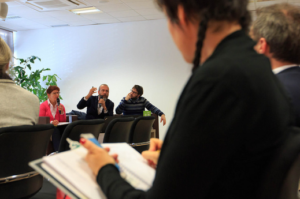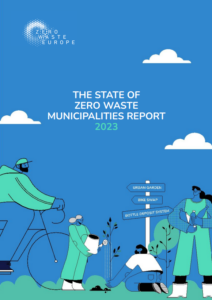More Tourists Equals More Waste

The municipality of Bled (with a population of 8,171 people) is one of the most famous and popular Slovenian tourist destinations, both nationally and internationally. The town is located in the foothills of the Julian Alps, on the picturesque shores of Lake Bled. At the beginning of 2015 Bled became the 7th Slovenian municipality on the road to Zero Waste. As a part of the recognition process we analysed their waste management data, and noticed a steep increase in municipal waste and residual waste generation during the summer months, starting at the beginning of June and lasting until the end of September when the data plummeted again. When we linked the data to tourist arrivals and overnight stays, and it matched perfectly.
When I started researching tourism it became obvious that waste is one of its major environmental impacts. Hotels, restaurants and other facilities use a huge amounts of products, very often delivered and packed in personal single use plastic packaging. For example, small plastic shampoo and soap bottles in hotel rooms. Or personal packaging for marmalade, honey and butter served at breakfast. Multiplied by the number of hotel beds and the number of overnight stays, it gives a rough picture of the magnitude of the problem. Data I came across claimed that as tourists we use more water, electricity and create more waste than when we live our ordinary everyday lives.
Looking for a solution, I was surprised how little literature is available on waste management in the tourism industry. The majority of those I could find mainly discussed strategies and recommendations, but in most cases lacked the data showing the effects of carrying them out. Zero Waste tourism soon became a focus of the Zero Waste Slovenia team. We set up a project aimed at finding waste minimisation and recycling solutions for events, hotels and restaurants.
The events turned out to be the easiest part. There is a fair amount of literature with solutions and examples from different countries, including detailed guidelines. We integrated those which best correspond to our solid municipal waste management systems and legislation, and included the Zero Waste International Alliance recognition requirements for businesses. Again, Zero Waste Europe member organisations and staff turned out to be a priceless source of information: thanks to their help we came across some inspirational stories like Boom festival in Portugal or Ecofesta Puglia in Italy. Armed with Zero Waste Events Guidelines, tailor-made for Slovenian circumstances, we organised several workshops around the country, which were eagerly welcomed by event organisers.
Workshop for event organizers in Maribor (Photo: Ekologi brez meja)
Hotels were a harder nut to crack. First we checked the requirements of various green certificates, which mainly require waste separation and some basic prevention measures. The WRAP program is a good source of ideas to minimise food waste in restaurants and hotel kitchens. The share of biodegradable waste in all waste generated in an average hotel is between 40% and 60%. After a while, we started believing hotels might be too big a challenge for a small team as ours.
That was until Zero Waste Europe’s Enzo Favoino came to our rescue (again). He connected us with Antonino Esposito, who started introducing Zero Waste principles to hotels in famous Italian tourist destination, Sorrento. Antonino kindly accepted our invitation to join the project, and we slowly began to understand why we could not find much literature. Every hotel has its own story. They differ in size, services they offer, stars categories they need to comply with; some have already adopted green policies, others have not. Reaching Zero Waste goals requires a complete change of the hotel’s culture, involving employees, guests and suppliers. Such changes can only be successful if they are developed slowly.
After Antonino trained and equipped our team with his Zero Waste tips and tricks, we were eager to find a pilot hotel ready to embark on a Zero Waste adventure. It turned out the concept perfectly fitted the vision of Hotel Ribno in Bled. At the moment our team – with Antonino’s support – is drafting proposals for actions towards Zero Waste goals.
The co-funding by the Ministry of Environment ended at the end of February, with the closing event at Astoria Hotel in Bled, a learning centre for catering and tourism. Antonino Esposito and Roberto Paladini (Ecofesta Puglia) presented their work to a number of hotels, event organisers, municipalities, NGOs, waste management companies and representatives of the Slovenian Tourist Organization. Since several hotels and event organisers expressed their interest in Zero Waste, we are convinced Zero Waste tourism will become one of our success stories.
Antonino Esposito and Roberto Paladini presenting their work in Bled (Photo: Ekologi brez meja)
Globally, tourism is one of the fastest growing industries, with Europe contributing with half of international arrivals and about the same in income. More tourists equals more waste, and more waste inevitably translates into a larger environmental footprint. This is not just a problem for the areas where establishing an efficient waste management system is challenging, like small islands or remote, sparsely populated areas. Bananas or pineapples travel hundreds if not thousands of kilometers to end up at the breakfast buffet of a Northwest town in the Slovenian Alps, using energy and creating GHG emissions. Waste, and especially plastic waste, represents a huge problem also in terms of the decreased value of tourist destinations. Solid waste minimisation should therefore become an important goal for tourism sector. Not only to manage its own waste, but also to support and participate in setting up efficient waste management systems in tourist destinations. After all, who would want to lie on a beach covered by plastic trash, or stay in a mountain camp with waste rotting nearby?




